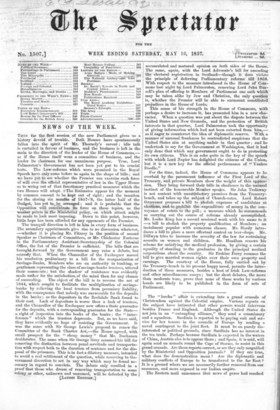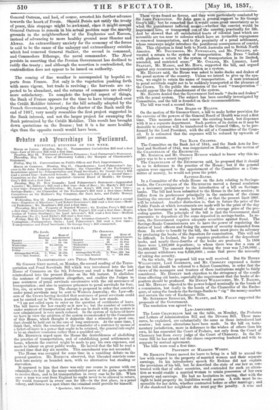NEWS OF THE WEEK.
THU'S fax the first session of the new Parliament gives us a history devoid of trouble. Both Houses have spontaneously fallen into the spirit of Mr. Thornely's caveat ; idle talk is curtailed in favour of business and the business is left in the
main to the direction of the leader of the House of Commons,— as if the House itself were a committee of business, and the leader its chairman for one unanimous purpose. True, Lord Palmerston's Government has not been yet put to its crucial tests. The Law-reforms which were promised in the Royal Speech have only come before us again in the shape of bills ; and we have yet to see whether the Premier can exercise such force of will over the official representative of law in the Upper House as to wring out of that functionary practical measures which the two Houses will adopt. t The Estimates appear for the moment by common consent to be kept out of sight ; and the taxation for the dosing six months of 1857-'8, the latter half of the Budget, has yet te,be arranged ; and it is probable that the Opposition will concentrate its force on these topics, as the weaker points in the Ministerial policy, on which attack might be made to look most imposing. Down to this point, however, little hope has been afforded for any opponents of the Premier.
The tranquil direction is left to him in every form of business. The secondary appointments give rise to no discussion whatever, —whether it is placing Mr. Fitzroy in the position of second Speaker as Chairman of Committees, or Mr. Chichester Fortecue in the Parliamentary Assistant-Secretaryship of the Colonial Office, the fiat of the Premier is sufficient. The bills that are brought forward by the Government may raise a debate, but scarcely that. When the Chancellor of the Exchequer moved his resolution preliminary to a bill for the reorganization of Savings-Banks, Members who are an authority in banking, or gentlemen representing the class of savings-banks trustees, uttered their comments ; but the shadow of resistance was evidently made rather for the satisfaction, of the mind than for any chance of succeeding. The object of the bill is to reverse the act of 1844, which sought to facilitate the multiplication of savingsbanks by relieving the local trustees from pecuniary liability, with the consequence that nobody was answerable for the deposits in the banks ; as the depositors in the Rochdale Bank found to their cost. Lack of depositors is worse than a lack of trustees, and the Chancellor of the Exchequer now offers a State guarantee for the deposits, with a corresponding guarantee for the State— a right of inspection into the books of the banks ; the " interference " which the trustees deprecate. But, as we have said, they have evidently no hope of resisting the Government. It was the same with Sir George Lewis's proposal to renew the Committee of the Bank Charter Act,—the House agreed, with small prospect for the "cheap money" that Mr. Buchanan desiderates. The same when Sir George Grey resumed his bill for removing the distinction between penal servitude and transportation with respect both to the duration of sentence and for the disposal of the prisoners. This is in fact a dilatory measure, intended to avoid a real settlement of the question, while reserving to Government discretion to act in any way which may be found necessary in regard to convicts. The debate only resulted in a proof that those who dream of renewing transportation to some colony or other, unknown and unnamed, will be defeated by the accumulated and matured opinion on both sides of the House. The same again, with the Lord Advocate's bill for amending the electoral registration in Scotland—though it does violate the principle of deferring Parliamentary reforms till 1858. With respect to the measure introduced to the House of Commons last night by Lord Palmerston, renewing Lord John Russell's plan of offering to Members of Parliament one oath which may be taken alike by Jew and Christian, the only question is, whether the Premier will be able to surmount constituted prejudices in the House of Lords.
This sense of his strength in the House of Commons, with perhaps a desire to increase it, has presented him in a new character. When a question was put about the dispute between the United States and New Granada, and the protection of British interests in that quarter, Lord Palmerston took the opportunity of giving information which had not been extorted from him,— as if eager to counteract the idea of diplomatic reserve. With a manner of unusual frankness he contradicted suspicions that the United States aim at anything unfair in that quarter ; and he undertook to say for the Government at Washington, that it had only done that which any government ought to do in protecting its own citizens. This is an echo quite in the key of the speech with which Lord Napier has delighted the citizens of the Union, but it is a new key for the official performance of "Yankee Doodle."
For the time, indeed, the House of Commons appears to be overlaid by the paramount influence of the First Lord of the Treasury, and private Members show the weight of this oppression. They bring forward their bills in obedience to the natural instinct of the honourable Member speeies. Sir John Trelawny is not content with unsatisfactory promises from the Treasurybench, and takes up the subject of Church-rates. Lord Robert Grosvenor proposes a bill to abolish expenses of candidates at elections, and to prphibit the expenditure of money in the conveyance of voters to the poll ; a measure which he recommends as carrying out the course of reforms already accomplished. Mr. Locke King has a second sessional work with his name to it —a bill to abolish the property qualification of Members ; an instalment popular with numerous classes. Mr. Hardy introduces a bill to place a more effectual control on beer-shops. Mr. Dillwyn tries to increase the severity of the law for restraining assaults on women and children. Mr. Headlam renews his scheme for satisfying the medical profession, by giving a certain equality of standing to the graduates in the principal medical corporations about the country. Sir Erskine Perry resumes the bill to give married women rights over their own property and earnings. The courtesy of the House, fully carried out by the Treasury-bench in its present happy mood, permits the introduction of these measures, besides a host of Irish Law-reforms and other miscellaneous essays ; but the short debates, the more than moderate tone, prove that none of these works by various hands are likely to be published in the form of acts of Parliament.
The " lorcha" affair is extending into a grand crusade of Christendom against the Celestial empire. Various reports on the subject have intimated that other powers would intervene besides France and England. Although the United States do not join in an "entangling alliance,' they send a commissmy and a squadron. Sardinia is reported to be paying suit and service for her tenure in the councils of Europe by sending a naval contingent to tho joint fleet. It must be on purely disinterested or political grounds, since Sardinia has no interest in the tea trade. Perhaps because Sardinia is expected in the waters of China, Austria also is to appear there ; and Spain, it is said, will again send an armada round the Cape of Storms, to assist in this grand crusade. Are these reports correct, or are they only magnified by the Ministerial and Opposition journals ? if they are true, what does the demonstration mean ? Are the diplomatic and military conflicts of Europe to be transferred to the far East ? It is a ground where we are necessarily further removed from our resources, and more exposed in our Indian empire.
The Eastern mail announces that news of peace had reached
General Outram, and had, of course, arrested his further advance towards the heart of Persia. Should Persia not ratify the treaty of peace, this stoppage might be awkward, since it might compel General Outram to remain in his actual position near the marshy grounds in the neighbourhood of the Euphrates and Karoon, instead of advancing to more healthy ground near Shuster and Ahwaz. An extraordinary anxiety for the economy of the forces is said to be the cause of the unhappy and extraordinary suicides which had removed General Stalker, the second in command, and Commodore Etherege, the naval commander. The Nord persists in asserting that the Persian Government has declined to ratify the txeaty ; and although the assertion is contradicted, the contradiction does not appear to be issued on authority.
The coming of fine weather is accompanied by hopeful reports from France. Not only is the vegetation pushing forth with more vigour, but trade is reviving ; the harvests are expected to be abundant, and the returns of commerce are already more satisfactory. To complete the hopeful aspect of things, the Bank of France appears for the time to have triumphed over the Credit Mobilier interest ; for the bill actually adopted by the French Government, to prolong the charter of the Bank until the end of 1 89 7, very nearly resembles the first project suggested in the Bank interest, and not the larger project for swamping the Bank patronized by the Credit Mobilier. This result has brought down quotations on the Bourse ; but it is a far more healthy sign than the opposite result would have been.



























